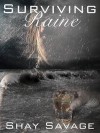 WARNING: Do NOT read the author foreward. It totally gives away a climactic ending. Thanks to the GoodReads community for warning me.
WARNING: Do NOT read the author foreward. It totally gives away a climactic ending. Thanks to the GoodReads community for warning me. I feel like I just ran a marathon with a heart condition. As soon as I opened the book, I was swept up in the story and couldn't stop until the fiery, breathless end. I don't say this often. It takes a while for me to feel comfortable in a new book. I like to feel things out, come to my own conclusions. But Stephen King, in his insidiously masterful way, lured and cocooned me from the first page like spider pouncing on a hapless little moth stuck in a web.
Plot Summary
Our main character is Ben Richards. He's an average Joe type of guy, eking out a life in a vastly dystopian future US of A. In this version of our future, the disparity between the poor and rich is greater than ever. The wealthy have access to luxury cars, groceries, and top notch medical care. The poor...well, you can imagine when we read Richards' home situation: his wife is a prostitute and the main breadwinner of the family, and his baby girl is bedridden with influenza because they can't afford legitimate medicine. As his daughter's condition worsens, Richards enters himself in a live TV game show called Running Man. For as long as he can survive, Richards will flee across the country and earn 100 New Bucks for every hour he is alive. That is, if he can evade professional Hunters hired to track and kill him, and also disguise himself from the locals who are given money rewards if they report a sighting.
This concept should hearken to other familiar works of popular fiction:


And even another King novel with a similar concept,

There are probably many more that I haven't read or even heard about. But at the same time, THE RUNNING MAN was, even to my Hunger Gamed-out mind, an adrenalin rush.
In essence, THE RUNNING MAN is an example of pure action driven storytelling that is done in a compelling way. You don't really get to understand why the world is the way it is, why the people enjoy watching human beings being treadmilled to death or being hunted like rats for a little cash, or why no one can muster up sympathy for children dying from cancer. There's just not enough time to sit back and absorb the people and the environment. When you think you can stop to breathe, someone shoots a gun or sirens blare in the background, and you're off and running again.
Granted, the characters Richards meets on the run are an interesting assortment of people. But again, though I sympathized with them, I couldn't bring myself to care for them more than resolving that burning question, what happens next. The one exception may be Bradley, but I felt satisfied enough to know he was alive and just on the run.
Consequently, Richards doesn't lend himself to deep, solemn questioning of the morality of the government or his own actions. He's a good guy, but he shoots and kills and blows things up because it's what he needs to do to survive and make enough money for his family. He's a likeable character, sure, but he's three dimensional in a flat way. He has motives and moments of moral ambiguity, especially when he kidnaps the woman, though even then, he's a supremely decent guy given the situation, but overall he's a wildly functioning cog in the dream machine that is the story. It's the story, I think, that gets the spotlight this time around.
Overall, THE RUNNING MAN was a fantastic read that is dark, action-packed, and a little wonky, if you will. The prose is littered with some anachronistic slang. The world building, while physically stark, is thematically hazy because explanations are sparse and far in between. But the story itself is fantastic and definitely well worth the read.
3.5 to 4.0 stars and highly recommended, especially for fans of gritty, dystopian fiction.








